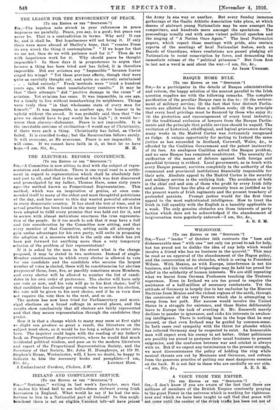WILSON ISM.
[To THE EDITOR or THE "SPECTATOR."]
SIR,—Your " leader " of October 14th contrasts the " base and dishonourable man " with one " not only too proud to ask for help, but too proud not to dislike the idea of any help which would involve a friend who has no business in the quarrel." This may be read as an approval of the abandonment of the Hague policy, and the consecration of its obstacles, which is owing to President Wilson. With Mexico, as with Europe, interference is not his business, and the victims of brigandage may lie held too proud for belief in the solidarity of human interests. We are still repeating what we learnt from German Professors touching the Teutonic superman. Even in Ireland we are too proud to require the assistance of a half-million of necessary combatants. Yet the attitude of Germany is largely due to her exclusion by the Monroe Doctrine from Mexico and the richest regions of the earth, through the connivance of the very Powers which she is attempting ,to sweep from her path. Her success would involve the United States in a struggle for existence, and those States deliberately leave to Europe the task of averting it. Mr. Roosevelt merely declines to pander to ignorance, and risks his interests in awaken- ing intelligence. There is nothing base in the hope that he may succeed, or that even Ireland may be guided by common-sense. In both cases real sympathy with the thirst for plunder which has infected Germany may be suspected to exist. An honourable man will expect even his enemy to act better. - Other politicians are possibly too proud to postpone their usual business to present exigencies, and the confusion between war and cricket is always with us. But if we expect any termination to the present struggle, we must discountenance the policy of holding the ring while neutral throats are cut by Mexicans and Germans, and refrain from the generous practice of patting our most dangerous enemies on the back. It is not fair to those who are cordially on our side.














































 Previous page
Previous page